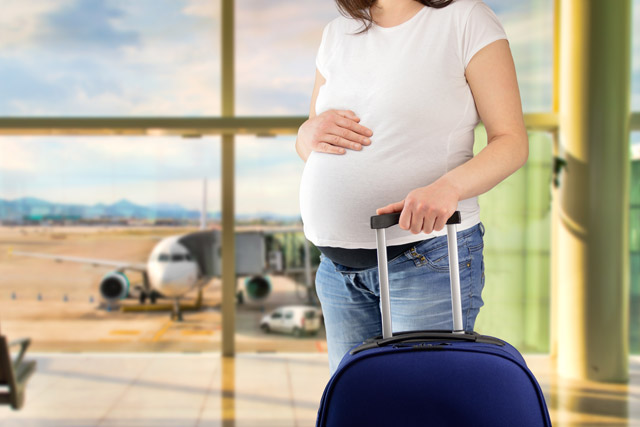Being pregnant doesn’t mean you should stay at home and dive into the routine. In fact, a healthy pregnancy doesn’t put any restrictions on your active lifestyle and plans for the future. So if you happen to be planning an air trip for your vacation or a business trip before you’ve found out you are expecting a baby, there’s nothing to interfere with your intentions and goals.
Pregnancy itself is not a contraindication to flying. So if you want to visit your family living in the other part of the country or want to spend a week on a sunny beach somewhere in the Caribbean, or need to travel on business, go ahead! In this post, we’ll explain as many details about flying while pregnant as possible. So get on board, and let’s find out what to expect.
What Do I Need to Fly during Pregnancy?
One of the most common questions pregnant women have is whether they need any special preparation for a flight. But before we specify those things, we should say that you can safely enjoy the air travel until 36 weeks of pregnancy. Generally, this is the borderline where airline companies allow such passengers. And it’s not due to their bad attitude toward pregnant passengers. In fact, this is done to avoid births during the flights, which still happens sometimes.
Getting back to the preparations, here’s what you need to take a flight:
- Travel insurance and health insurance. It’s essential to have your insurance specific for pregnant individuals. It should include expenses related to labor. Besides, it should cover medical care if you have some pregnancy complications while on travel.
- Make an appointment with your OB-GYN and GP to ensure you and your baby feel well and can cope with the air travel without problems.
- Check your airline policy regarding pregnant individuals. Some companies will agree to travel with pregnant passengers who are not later than 28 weeks gestation, while others don’t set any restrictions until you are 36 weeks pregnant.
- Take your maternity medical records with you, so you can provide a doctor with every bite of information they may need if any pregnancy issues arise while in your destination.
- When going on international travel, make sure you have been vaccinated against diseases specific to that region. Please note that vaccination with live vaccines is not recommended for expecting mothers.
- If you are 28 weeks + in pregnancy, you may need a letter from your OB-GYN that confirms your due date.
That’s everything you need to prepare in advance to make sure you can take your flight. However, this is only the “paper part” of the preparations.
When Is It Best to Travel?
One of the essentials of safe and successful air travel during pregnancy is choosing the right time. The American College of Obstetricians and Gynecologists recommends that women plan their air trips between 14 and 28 weeks of pregnancy.
Why do they choose this period? The second trimester of pregnancy that falls on this period is considered the safest in terms of any pregnancy complications, including preterm labor. It’s hard to travel during the first trimester as most women suffer from morning sickness and tiredness. Besides, the first three months of gestation bear high risks of miscarriage, so you’d better postpone your travel.
The third trimester is not the best choice for air trips either. The size of the baby bump doesn’t allow for comfortably sitting in the plane seat. Besides, the swelling of the feet, which is a common issue at such a pregnancy term, may worsen due to the flight height.
Some Pieces of Advice for a Safe Flight
Getting recommendations from your health care specialist is essential before taking a plane trip. Knowing your medical history, your doctor may give you specific advice concerning your and your baby’s safety during the flight. As for the general recommendations for air traveling expecting moms, they are as follows:
- Drink plenty of fluids during the flight. The air in the plane is very dry, so you have to make sure to avoid dehydration.
- Use compression stockings to prevent your legs from swelling. They will also help normalizing your blood flowing to and from your limbs, which is essential to avoid the formation of blood clots and the problems they may cause.
- Take a lot of snacks. No matter how long your flight should be, you’d better have some snacks with you. The airport food and the meal you will get on the plain may not be the quality you want, or they may not be enough for a pregnant woman with some food cravings.
- Choose an aisle seat instead of a window seat. Making a decision in favor of the aisle seat, you kill two birds with one shot. First, you get some extra space. Second, you’ll be able to get up and move around the cabin whenever you need it without the need to disturb your neighbor passenger.
- If possible, opt fora midday flight instead of the one in the morning. This tip may be especially helpful for moms-to-be who suffer from morning sickness.
- Never hesitate to ask flight attendants for help. Whether you want some more snacks or drinks, or anything else, don’t hesitate to address to flight attendants. They’ll be glad to help you feel better during the flight.
The last but not least, make sure you’ll have access to quality medical attention in your destination. So in case you have any concerns about your pregnancy, you can receive the assistance you need.
Flying while Pregnant – Bottom Line
Flying while pregnant is a bit more challenging experience as you bear responsibility not only for yourself but for the baby as well. But if you have no contraindications to such a means of traveling, why should you refuse it?




